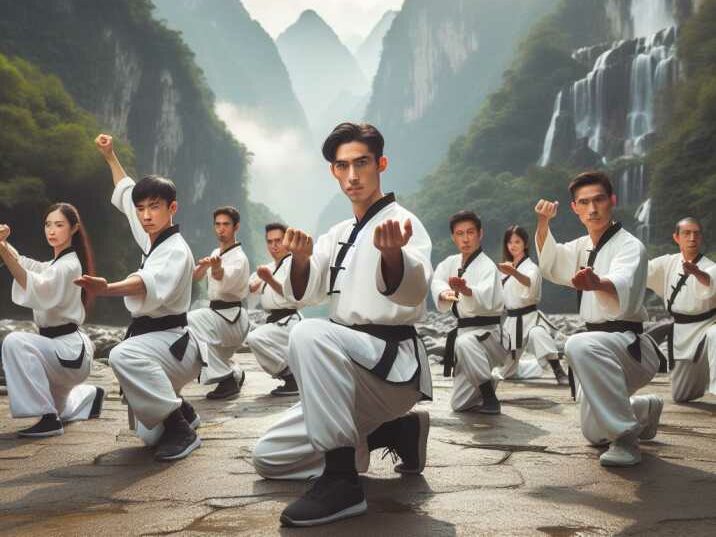Introduction:
Table of Contents
Kung Fu, an ancient Chinese martial art, is renowned for its fluid movements, intricate techniques, and philosophical principles. Often depicted in movies and admired for its grace and power, Kung Fu is not just a physical discipline but also a way of life. One common question that arises is whether Kun Fu for different body types. Let’s delve into this fascinating topic and explore how the principles of Kung Fu for different body types customized to accommodate individuals with varying physical characteristics.
Understanding Kung Fu:
Kung Fu, also known as Wushu or Chinese martial arts, encompasses a wide range of fighting styles and techniques. From Shaolin Kung Fu to Tai Chi, each style has its unique characteristics and training methods. One of the core principles of Kung Fu is flexibility, both in body movements and mindset. Contrary to popular belief, Kung Fu is not limited to individuals with a specific body type. Instead, it emphasizes adaptability and encourages practitioners to leverage their strengths while overcoming weaknesses.

Adaptability in Kung Fu:
The beauty of Kung Fu lies in its adaptability to different body types. Unlike some sports or martial arts that prioritize specific physical attributes, such as height or weight, Kung Fu focuses on harnessing one’s innate abilities and maximizing their potential. Whether you’re tall or short, slender or muscular, there’s a style of Kung Fu that can be tailored to suit your body type.
Customizing Techniques:
In Kung Fu, techniques can be modified and personalized to accommodate individual differences. For example, individuals with longer limbs may excel in striking techniques, such as kicks and punches, while those with a lower center of gravity may find grappling and sweeping techniques more effective. By understanding their body’s unique strengths and limitations, practitioners can customize their training to optimize performance.
Embracing Diversity:
Kung Fu embraces diversity and welcomes practitioners of all ages, genders, and body types. Whether you’re a child learning discipline and coordination or an adult seeking physical fitness and self-defense skills, Kung Fu offers something for everyone. Instructors often adapt their teaching methods to accommodate the needs of diverse students, ensuring that everyone can benefit from this ancient art form.
Benefits of Adaptability:
The adaptability of Kung Fu not only allows individuals to train according to their physical attributes but also promotes inclusivity and empowerment. By embracing diversity and encouraging customization, Kung Fu fosters a sense of belonging and self-confidence among practitioners. Moreover, the holistic nature of Kung Fu training promotes overall well-being, including physical fitness, mental focus, and emotional balance.

Table of Information Kung Fu for Different Body Types:
| Body Type | Recommended Techniques |
|---|---|
| Tall | High kicks, long-range strikes |
| Short | Low stances, close-range techniques |
| Muscular | Power-based strikes, grappling |
| Lean | Agility-focused movements, speed |
Conclusion:
In conclusion, Kung Fu is a versatile martial art and kun fu for different body types. By emphasizing flexibility, customization, and inclusivity, Kung Fu enables individuals to harness their unique strengths and embark on a transformative journey of self-discovery. Whether you’re tall or short, agile or robust, Kung Fu offers a path to physical fitness, mental clarity, and personal growth. So, regardless of your body type, take the first step on your Kung Fu journey and unlock your full potential.
FAQs:
Q1: Can anyone learn Kung Fu, regardless of their body type? A1: Yes, Kung Fu is suitable for individuals of all body types. Its adaptability allows practitioners to customize techniques according to their physical attributes.
Q2: Are there specific styles of Kung Fu for different body types? A2: While there are various styles of Kung Fu, most techniques can be modified to suit different body types. Instructors often tailor training to accommodate individual needs.
Q3: I’m not very flexible. Can I still practice Kung Fu? A3: Absolutely! Kung Fu training can improve flexibility over time. Instructors can adjust exercises to gradually enhance flexibility, regardless of your starting point.
Q4: Is Kung Fu only for self-defense, or can it also improve fitness? A4: Kung Fu offers a holistic approach to physical fitness, incorporating strength, flexibility, endurance, and coordination. While it includes self-defense techniques, it also promotes overall well-being.
Q5: How can I find a Kung Fu class that suits my body type? A5: Look for reputable Kung Fu schools or instructors who emphasize inclusivity and customization. They should be willing to adapt training to accommodate your body type and goals.


